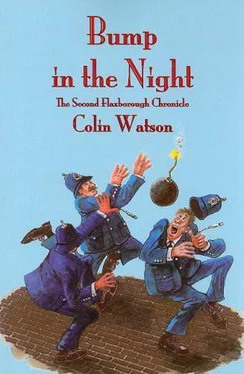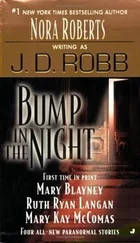“Not bad,” Payne said. “Actually, though, there are thin threads of reason running through this business, you know.”
“Ah, now those,” Purbright said promptly, “I should like to hear about.” Spotting the threat to his pawn he moved out a knight to cover it. “Let’s take the explosions in order. What grudge did he bear the drinking fountain?”
“Not an aesthetic one, I assure you, though God knows that would have been understandable. No, the thing was a memorial. It was put up by the widow of a man called Courtney-Snell. And Courtney-Snell, in his time, had won an action for slander against Biggadyke.”
“Posthumous vengeance, you think?”
“Niggardly; but satisfying, perhaps.”
“All right. And the statue?”
Payne paused to open a path for his remaining bishop. “The statue,” he repeated. “That gesture was a little less personal, but if you knew Chalmsbury you would appreciate it. Does the name of the late Alderman Berry mean anything to you?”
Purbright shook his head.
“He was a notable zealot—or notorious bigot—according to taste,” Payne said. “I scarcely remember him, but they say that when he died the local brewery issued their draymen with white ribbons to wear in their hats.”
“A warrior of abstinence.”
“He was indeed. He also made a great deal of money, with a modest fraction of which he endowed an ugly chapel, so canonization—in Chalmsbury terms—was inevitable. We immortalized him in gunmetal, or whatever it was that Biggadyke found so challenging.”
“You suggest, then,” said Purbright, bringing up another pawn, “that Biggadyke’s second onslaught was that of a drinking man upon a totem of teetotalism.”
“You express it neatly. Yes, a gesture of principle, I should say. Biggadyke was not richly endowed with principles, so he was all the more likely to proclaim spectacularly what few he had. Had he lived, I feel he might have founded a Fellowship of Bad Templars.”
Purbright silently scrutinized the new position of Payne’s queen, which his opponent had just moved to the van of his bishop. Then he said: “And what of the great eye of Mr Hoole? That affair has a Kiplingesque flavour, to my mind.”
“The most intriguing of the three,” Payne agreed. He groped beneath the bed and produced a bottle. Without taking his eyes from the board, Purbright felt in his pocket and handed Payne a corkscrew. Soon they were sipping from tooth glasses one of Councillor Pointer’s more moderately priced clarets.
“You’ve met Barrington Hoole, I presume,” said Payne.
“Fleetingly, yes.”
“Quite a brilliant chap, oddly enough. We were in the same year at Cambridge. I never dreamed then that we’d wind up by being fellow shopkeepers. However...” Payne eyed his wine quizzically and scratched a fragment of dried toothpaste from the glass rim with his nail. “It seems he was rather unkind to the oaf Biggadyke—absolutely deservedly—about a month ago. Hence, I think, the reprisal on the eye. He was very fond, of it, poor chap,” Payne added sadly.
Purbright blocked with a pawn the line of threatened advance by Payne’s queen, and went on: “The question that no one seems able to settle is where Biggadyke obtained his explosive. It looks as though I shall have to go back without an answer.”
Payne looked up. “So that’s why they sent you, is it? I was wondering if you were M.I.5 or something. Kebble’s convinced of it.”
Purbright grinned. “That’s probably because I took your advice and was shockingly indiscreet. Tell me, though, from what you know of Biggadyke how do you imagine he’d set about that queer campaign of his? Where would he get the stuff?”
Payne considered. “As a haulage contractor he made some useful, if questionable, contacts during the war, I believe. Perhaps there’s a black market in gelignite, or something.”
“There is, unquestionably. But I should suppose that quotas are pretty well taken up by gentlemen with banking interests. I’d be most surprised to learn that Mr Biggadyke had been able to whistle any his way. Anything else occur to you?”
Payne poured out some more wine before replying. “There was a rumour,” he said slowly, “of some explosive having disappeared from that Home Guard place...”
“Civil Defence,” Purbright corrected.
“Yes, but that’s at Flaxborough anyway. You’ll know all about it.”
“Not all, no. But the connection with this lot seems very tenuous.”
Purbright returned his attention to the game. Payne’s last move, he noticed, appeared to have no immediate object. But his own interest had waned and he contented himself with advancing another pawn. After quite a long silence he asked: “Would it be possible, do you think, for Biggadyke to have manufactured his explosive himself?”
Payne hesitated. “Chemically, you mean?”
“Yes. Say it were some nitro compound. Nitro...well, nitro-glycerin: I suppose that’s the best known.”
Payne thoughtfully caressed the waxed points of his moustache, then shrugged. “Feasible, I imagine. Very dangerous, though.” He got up and crossed the room to a bookcase. “There may be something among these that will help. They’re a little out of date as textbooks go but organic chemistry is less subject to fashion than physics.”
Purbright watched him kneel and pull out, one by one, the books on the bottom shelf. The lettering on the spines of most of them was nearly indiscernible; they probably had been second-hand when Payne acquired them in his university days.
At last Payne found the volume he had been seeking. He reached up and put it on the top of the case between a pair of photographs while he tidied the rest of the row. Purbright glanced idly at the two pictures. One was a faded sepia portrait of a woman in late Victorian or Edwardian dress; the other was of a small girl standing beside a television camera.
Payne brought the book over, referred to its index and thumbed back to the section he wanted.
“Simple enough in theory,” he said after a while. “Allow a mixture of concentrated nitric and sulphuric acids to act on ordinary glycerin and separate the oily liquid that rises. There you have it—nitro-glycerin.”
“Well, then: even Biggadyke...”
Payne shook his head. “No, I said it was simple in theory. But the stuff is deperately unstable, remember. You can’t carry it around like lemonade. One good jolt and—whoosh!”
“Yet dynamite is safe enough to handle, surely. Isn’t that nitro-glycerin in some form or other?”
Payne turned a page. “It is, actually. Hang on a minute.” He read further through the text. “Yes, here we are: they absorb the liquid nitro-glycerin in something called kieselguhr.”
“And what’s that?”
“No idea. Here it just calls it ‘an inert, clay-like substance’.”
Purbright, feeling somewhat inert himself, said nothing for a few moments. Payne closed the book and waited.
“Detonators,” Purbright said suddenly. “All these timebomb things are set off by detonators, aren’t they?”
“Yes, I suppose they are.” Payne frowned at the cover of the textbook. “I don’t think this would be any use,” he said. “You’re still thinking along do-it-yourself lines, are you?”
“More or less.”
“Well, the only detonating agent I can call to mind is mercury fulminate. I don’t know whether it’s still used nowadays.”
“It could be made at home, though? Or something like it?”
“I wouldn’t like to say offhand.”
Purbright stretched, yawning. “Never mind,” he said, “it all sounds terribly unlikely. Anyway, from what I’ve heard of Biggadyke I can’t picture him tackling anything so complicated.”
Читать дальше












